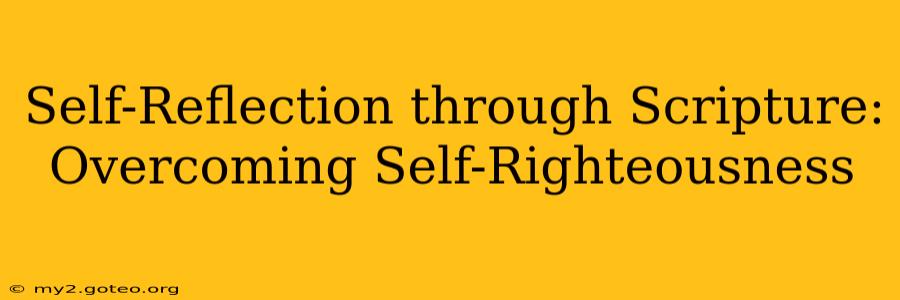Self-righteousness. The very term feels heavy, doesn't it? It's a subtle yet powerful enemy, silently eroding our humility and hindering our relationship with God and others. It's the insidious belief that we are morally superior, more righteous, or somehow "better" than others. But the path to genuine spiritual growth lies in confronting this insidious trap, and Scripture offers a powerful mirror to aid in this self-reflection. This journey of overcoming self-righteousness is deeply personal, requiring honest introspection and a willingness to embrace God's grace.
What is Self-Righteousness?
Before delving into Scripture, it's crucial to understand what self-righteousness truly entails. It's not simply having high moral standards; rather, it's a deceptive pride that blinds us to our own flaws and shortcomings. It manifests in judgmentalism, a critical spirit, and a persistent need to prove our worthiness to God and others. We might outwardly appear devout, yet inwardly harbor a sense of superiority, believing our actions merit God's favor independently of His grace.
How Does Scripture Reveal Self-Righteousness?
The Bible is replete with examples of self-righteousness, both in its condemnation and its consequences. The Pharisees, for instance, are frequently portrayed as meticulously adhering to the letter of the law while neglecting its spirit – compassion, mercy, and justice. Their outward piety masked an inward pride, leading them to harshly judge Jesus and those who followed Him. This serves as a stark warning: outward displays of religiosity don't automatically equate to genuine faith.
Examples of Self-Righteousness in the Bible:
- The Pharisees: Matthew 23 details Jesus' scathing rebuke of the Pharisees, highlighting their hypocrisy and self-righteousness. Their focus on outward appearances and adherence to rules overshadowed their inner lives and genuine relationship with God.
- The Rich Young Ruler: Mark 10 recounts the story of the rich young man who diligently kept the commandments yet struggled to surrender his wealth to follow Jesus. His adherence to the law wasn't enough; he lacked the humility to accept God's grace.
- The Prodigal Son's Older Brother: Luke 15 illustrates the self-righteousness of the older brother, who resented his father's forgiveness of his repentant younger brother. His righteous indignation revealed his own lack of compassion and grace.
How Can Scripture Help Us Overcome Self-Righteousness?
Scripture provides a powerful antidote to self-righteousness: humility. Numerous passages emphasize the importance of humility before God and others. Recognizing our dependence on God's grace is the first step towards overcoming self-righteousness.
Key Scriptural Passages for Overcoming Self-Righteousness:
- Proverbs 3:34: "Surely he scorns the scorners, but he gives grace to the humble." This verse underscores the direct correlation between humility and receiving God's grace.
- James 4:6: "But he gives us more grace. That is why Scripture says: 'God opposes the proud but shows favor to the humble.'" This emphasizes the active opposition God has towards pride and the favor He shows to those who humble themselves before Him.
- Luke 18:9-14: The Parable of the Pharisee and the Tax Collector demonstrates the difference between outward piety and genuine repentance. The tax collector's humble prayer is contrasted with the Pharisee's self-congratulatory prayer.
What are the Practical Steps to Overcoming Self-Righteousness?
Overcoming self-righteousness is a continuous process, not a one-time event. It requires consistent effort and a willingness to examine our hearts and motivations.
Practical Steps:
- Regular Bible Study and Prayer: Allowing Scripture to penetrate our hearts reveals our blind spots and helps us align our thinking with God's.
- Confession and Repentance: Honestly acknowledging our flaws and seeking God's forgiveness is crucial for dismantling self-righteousness.
- Seeking Accountability: Sharing our struggles with trusted friends or mentors provides valuable external perspective.
- Practicing Empathy and Compassion: Actively seeking to understand and care for others helps break down the walls of self-centeredness.
- Focusing on God's Grace: Remembering that our salvation is solely based on God's undeserved grace, not our own merit, combats the insidious lie of self-righteousness.
How can I Identify Self-Righteousness in Myself?
Recognizing self-righteousness can be challenging, as it often operates subtly. However, some key indicators include:
- Judgmental attitudes towards others: Do you find yourself frequently criticizing or condemning the actions or beliefs of others?
- A sense of superiority: Do you believe you are morally superior to those around you?
- Difficulty admitting fault: Do you struggle to acknowledge your mistakes and take responsibility for your actions?
- Resistance to correction: Do you become defensive when someone offers constructive criticism?
- A need to prove your worthiness: Do you feel a constant need to demonstrate your piety or goodness to God and others?
Frequently Asked Questions (FAQs)
Is it wrong to have high moral standards?
No, having high moral standards is not inherently wrong. The key is the motivation behind those standards. Are they rooted in a desire to please God and reflect His love, or are they driven by a need to prove your worthiness? The difference lies in humility and grace.
How can I tell the difference between righteous indignation and self-righteousness?
Righteous indignation stems from a love for justice and a desire to see God's will done. It is fueled by compassion and a desire to see wrongs righted. Self-righteous indignation, on the other hand, is driven by pride and a desire to feel superior. It lacks compassion and often manifests as judgmental criticism.
What are the consequences of unchecked self-righteousness?
Unchecked self-righteousness leads to spiritual stagnation, strained relationships, and a hardened heart. It hinders our ability to receive God's grace and prevents us from experiencing the fullness of His love.
Through diligent self-reflection guided by Scripture, we can dismantle the stronghold of self-righteousness and embrace the transformative power of humility and God's grace. This journey requires courage, honesty, and a persistent willingness to examine our hearts before God. The reward, however, is a deeper, more authentic relationship with Him and a more compassionate life lived in service to others.

